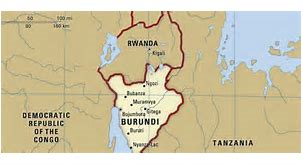Burundi and Congo demand reparations of nearly $43 billion for Belgium for its colonial history
- Posted on August 23, 2020
- Editors Pick
- By Glory

The recent Black Lives Matter movement in the United
States which was stirred by the death of George Floyd also created a ripple
among many African nations that are yet to recover from issues caused by
colonialism and its activities.
Burundi, a country located in the Great Rift Valley of
the East Africa recently demanded reparations from their former colonial masters,
Belgium and Germany. Burundi rose allegations against these European countries
for their past crimes against the African country.
Burundi has also joined forces with Republic of Congo
to demand reparations of 42.5 billion USD for the long-term colonial effects
inflicted on the African countries by their European colonialists.
A Congolese minister, Andre Lite, announced the
country’s plan for a call to give compensations to the country on the grounds
of the crimes committed against them by former colonial masters, earlier this
year.
“The regrets of certain Belgian officials will never
be enough in the face of their obligation to grant reparations to the victims
of colonization and their relatives,” the ministers said. “It is contradictory
or illogical to claim to be part of the respectful state and pretend not to
know anything about serious crimes that have been committed in the past.”
The reparations move was stirred up after the Belgian
King condemned the killing of George Floyd and expressed his regret over
Belgium’s history in a speech in June.
The Congolese minister also said “the horizon” may
seem to “be getting darker, after so many years of both denial and truth”,
however, they are more determined get reparations for past crimes committed against
the African nation.
According to Bloomberg News, Burundi spoke out in
support for Congo and also demanded their own reparations from Germany. Both
countries are also demanding the European nations to return traditional
historic artifacts, archival materials and objects that were stolen between
1899 and 1962.
In 1890, Germany colonized Burundi, Belgium took over
after Germany’s defeat in World War II, and re-colonized Burundi until their independence
in 1962.
According to Aloys Batungwanayo, a Burundi historian
and researcher at Lausanne University, Burundi’s present-day political issues
can be partly traced back to the decree passed by Belgian King Albert I that classified
the nation into three major ethnic groups.
“It is this decree that has led to conflicts in
Burundi and the region because some of the population was excluded from the
ruling class because of the decree,” Batungwanayo said.
Burundi accuses Belgium of creating many challenges
for the African nation through its past unsolicited interventions in the nation’s
affairs in both past and recent times. In 2015, Belgium sheltered Burundi
plotters of an attempted coup.
On its part, Belgium lawmakers are putting in efforts
to revisit the country’s colonial past with Congo, Burundi, and Rwanda to
reason out the matter and possibly make amends.


Be the first to comment!
You must login to comment